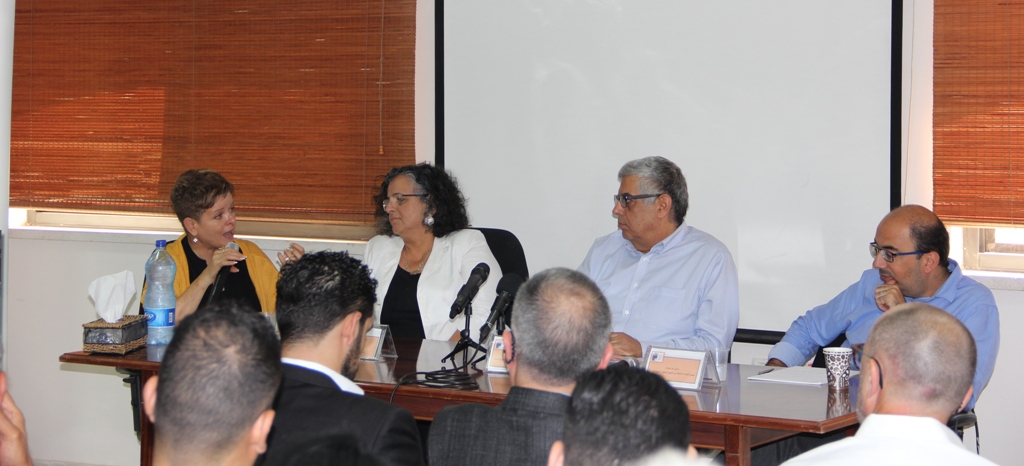Ramallah – Our partners at the Palestinian Forum for Israeli Studies (MADAR) held a seminar on September 3 at their office in Ramallah titled: “The Israeli Elections and their Reflections on Palestinians.” The seminar brought together Antoine Shalhat – Director of the Israeli Scene Unit at MADAR, Aida Touma – member of the Joint List for the Democratic Front for Peace and Equality, and Sami Abu Shehadeh – member of the Joint List for the National Democratic Alliance. Sessions were moderated by Honaida Ghanim, Director General of MADAR.
The speakers asserted that the next Israeli round of elections on September 17 will be decisive for the current Israeli prime minister Benjamin Netanyahu, as it not only has a bearing on his potential prosecution for corruption, but it would also critical for the completion of his “Greater Israel” political project. Netanyahu has already promised to “establish Jewish sovereignty” and include settlement outposts within the occupied territories in the annexation project. He has also recently gone on military adventures that have the potential to trigger a war.
According to the speakers, what particularly stands out about these elections is that the word “occupation” has been dropped from all Zionist parties’ election programs. Despite slight differences between the two main parties, settlers and settlement activity are firmly established in the political debate. Practically, the battle is being waged between the populist right wing on the one hand and the parties advocating economic and social agendas on the other.
In her opening remarks, Ghanim explained that when it comes to the subject of Palestinian presence, the election campaigns takes on three basic forms: It is an obstacle to be overcome; a security issue that requires more deterrence; and a presence that is obscure and camouflaged.
In his analysis two weeks ahead of the 22nd Knesset elections, Antoine Shalhat noted that the Kahol Lavan (Blue and White) alliance is presenting itself as a substitute for Benjamin Netanyahu, yet at the political level, Kahol Lavan embraces the same discourse and approach of the populist settler right wing.
Shalhat further elaborated that the Kahol Lavan election program stresses on unified Jerusalem and has commitment to settlement blocs. In addition, the alliance asserts that the occupied Syrian Golan Heights is non-negotiable, and views it as an “eternal part of Israel.” This position has never been declared by any Israeli government. Shalhat made it clear that the Kahol Lavan alliance’s main mission is to restore the “central Zionist movement” as part of the battle for setting the house in order.
In his presentation, Sami Abu Shehadeh elaborated on the electoral environment among Palestinians with Israeli citizenship. Abu Shehadeh expected that the re-established Joint List would win an increasing number of seats. Concerning the election battle’s discourse, Abu Shehadeh reflected on the fact that the occupation topic is not taking place at all. Even Meretz, which is perceived as the progressive leftist party, is not daring to talk about settlements nor is it capable of touching upon the subject of occupation.
Abu Shedaeha continued his remarks focusing on the Palestinians in Israel, whom he sees as a real force seeing that 950,000 Palestinians have the right to vote. This is the equivalent of 25 seats; “a very influential figure.”
The third speaker, Aida Touma, who is running for the elections as part of the Joint List, addressed that Netanyahu is using all possible tools to win the elections. As evidenced by his statements, Netanyahu is obsessed with making history – as if he has taken on the mission to bring the so-called “Greater Israel” project into reality. To build national momentum and influence the electoral scene, Netanyahu has opted for a military escalation and has launched air strikes on four Arab countries over a short span of time.
Touma further demonstrated that Netanyahu has made desperate efforts to unify the right wing and deploy Jerusalem through promotional home demolitions in places such as Al-Isawiya. He further pledged to give a ministerial portfolio to extremist Moshe Feiglin. Netanyahu is also pondering the changing of the status quo of al-Aqsa Mosque.
The problem facing Palestinians with Israeli citizenship according to Touma is that the group that spearheads a political project has been fragmented, thus presenting a challenge to the credibility of political parties. In addition, Touma’s overview of the electoral map for Palestinians with Israeli citizenship shows that approximately 12 percent are boycotting the elections for ideological reasons. Touma also mentioned that a large proportion of the electorate have lost confidence in the possibility of change.
Touma concluded that the fall of Netanyahu does not mean an end to his profound impact on the Israeli scene and, consequently, on the Palestinian context. However, there is much work that remains in the face of the Israeli oppression.









